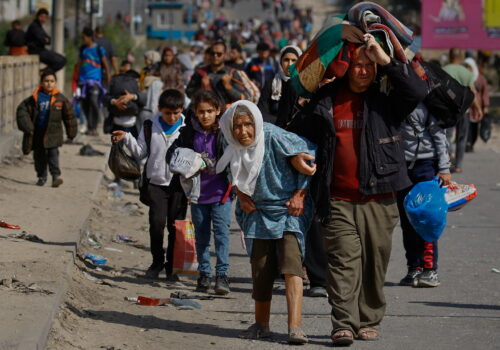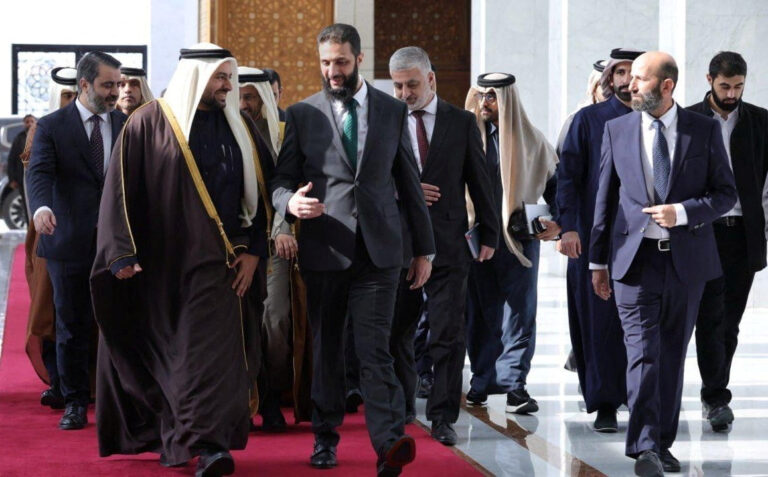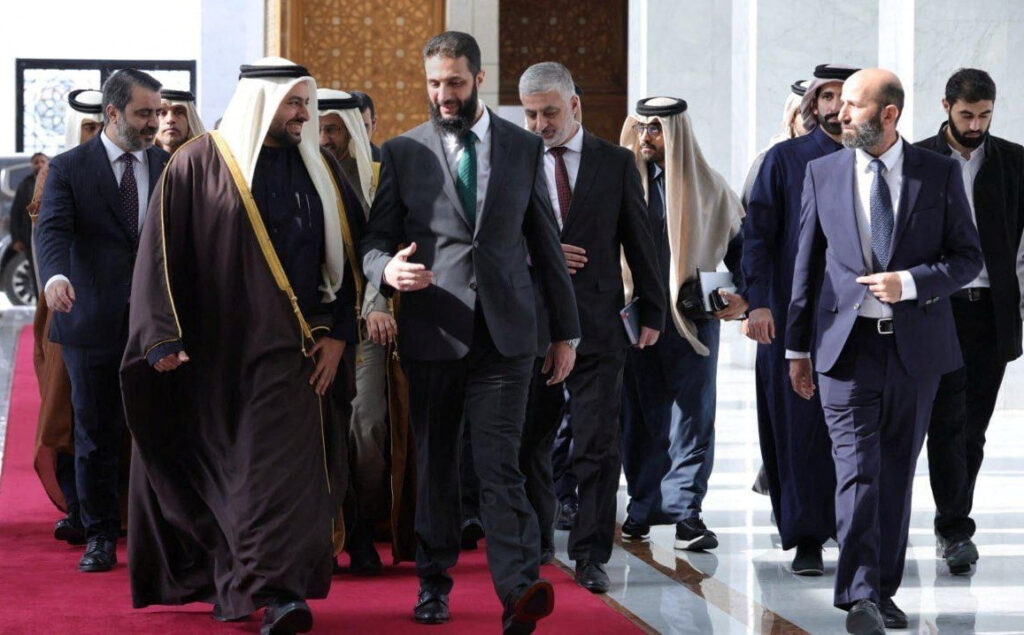Over the past six years, Gulf states have begun to normalize relations with Syria’s Bashar al-Assad regime, with some reopening their embassies in Damascus that had been closed after the outbreak of civil war in 2011. While Assad appeared firmly entrenched in power and Iran’s influence in the region continued to grow, there was a perceived strategic cost to keeping Assad isolated. .
Gulf states publicly cited regional tensions and the growing role of non-Arab countries in Syria as reasons for normalization. Former U.S. Ambassador Robert Ford said Saudi Arabia would follow similar moves by the United Arab Emirates (UAE) and Bahrain in December 2018 and move forward in September 2024, ostensibly to “reduce Iranian influence.” It was the last country to reopen its embassy in Damascus. Syria. (In contrast, Qatar remained firmly critical of the Assad regime and refused to normalize diplomatic relations.)
President Assad was welcomed back into the Arab League last year and attended a summit in Saudi Arabia. And the UAE has reportedly joined the US in negotiations aimed at securing US sanctions relief in return for President Bashar al-Assad curbing Iranian arms smuggling through Syria.
Gulf states that had supported Assad are now left empty-handed as he fled to Moscow after his regime’s surprisingly rapid fall this month. However, the current situation has challenged these countries, which rarely act as a bloc, to work together and take control of Syria’s future, both politically and financially, while adapting to Turkey’s growing prominence within Syria. It presents an enormous opportunity to make a significant impact.
Friendly Overtures of the Gulf
Immediately after the fall of the Assad regime on December 8, Saudi Arabia, the UAE, Bahrain, and Oman resumed diplomatic activities in Damascus, and in a statement on December 12, the Ministry of Politics of the new Syrian government expressed its gratitude. The statement followed talks the new leadership held with ambassadors from these countries and Qatar. Also on December 12, Bahrain, which led the Arab League this year, expressed support for the transition in a letter to Syria’s new leadership. On December 14, the Arab Ministerial Liaison Committee on Syria (including Arab, Western, and Turkish diplomats) emphasized Arab support for Syria’s political transition under an interim authority.
Meanwhile, Saudi Arabia expressed its “strongest support” for the Syrian people after the fall of Assad and praised the steps taken by the new leadership in Damascus to protect Syria’s ethnic minorities and promote stability. Amid reports that Saudi Arabia would begin supplying oil to Damascus, a Saudi delegation headed by a consultant to the Saudi Royal Court met with Syria’s new leader on December 22. A good indicator that Saudi Arabia is serious about cooperating with the Syrian regime transition is that it is already cooperating at the highest level with Syria’s most influential external player, Turkey, which is rapidly gaining power in the region. That’s what I’m doing.
The UAE, which has begun the normalization process with President Bashar al-Assad in the Gulf, is the last Gulf state to publicly hint at active involvement in the new Syrian regime, beginning with a telephone conversation between foreign ministers on December 23. It became. Dhabi will move cautiously to fully and publicly support the new Damascus government by sending humanitarian or financial aid to the country in the coming weeks, as neighboring Qatar is already doing. . On December 14, Anwar Gargash, UAE presidential foreign affairs advisor, expressed optimism about the new leadership’s language on unity. Gargash also stressed the need to remain vigilant given the new leadership’s ties to Islamist groups. In a post on I wrote that there is.
These developments across the Gulf are a positive signal that Assad and the normalized countries are likely to deal pragmatically with the new Syrian reality.
Türkiye’s growing influence
As the country with the strongest ties to Syria’s new leadership, Turkey has a strong stake in Syria’s future and even in the region, given its increasingly assertive role across the Middle East and North Africa. It will have an impact. Turkey’s victory in Syria has strengthened its position vis-à-vis Iran in other regions such as the South Caucasus, where Turkey maintains close cooperation with Azerbaijan while Iran has close ties with Armenia. is maintained. However, the Turkish government should not be the only one responsible for Syria’s reconstruction and nation-building. Working with Gulf Arab states could provide both legitimacy and vital financial resources to Syria’s reconstruction efforts.
Among the Gulf states, Qatar played a central role in facilitating talks between the foreign ministers of Arab countries, Turkey, Russia and Iran during the Doha Forum that ultimately decided Assad’s fate, and Damascus’ He is likely to exercise the greatest influence over the new leadership. . In a meeting with Atlantic Council experts (including myself) in Doha, just hours after the announcement of the collapse of the Assad regime on December 8, Qatari national security officials expressed their desire to maintain normal relations with the Assad regime. He expressed an atmosphere that seemed to justify the refusal to comply. Notably, Qatar was the only Gulf state to already host the Syrian National Union, recognizing it as the only legitimate representative of Syria.
Opportunities for the Trump administration
The fall of the Assad regime represents a major setback for Iran, and Gulf states must seize this moment as a unique opportunity to strengthen the Arab role in Syria’s future. By pressuring and guiding Syria’s new leadership to form an inclusive government, Gulf states can protect their interests while minimizing the risk of new instability that threatens the entire region. can.
The Trump administration also has an important role to play. Syria’s new government faces the difficult and costly task of reconstruction, but regional and international support will be essential to prevent Syria from failing again and destabilizing the region. Dew. President-elect Donald Trump, along with Turkey and the Arab Gulf states, should lead the way in pooling the funds needed for Syria’s reconstruction and transitional governance, a critical strategic challenge to Iran’s presence in Syria. It will also be a blow. Such support should be coupled with clear conditions that guarantee stability and an inclusive political process to build something better than what Syrians endured under Assad.
The fall of the Assad regime will have a significant impact on the region in the coming years. And the United States and Gulf states have new financial and diplomatic influence in shaping what that outcome will be. The new government in Damascus is likely eager to gain Washington’s approval as soon as possible to cement its international legitimacy. This gives the United States and its Gulf allies an opportunity to positively influence Syria’s new political process and ensure necessary changes if Syria’s new leadership goes off course.
Jose Pelayo is deputy director of the Scowcroft Middle East Security Initiative at the Atlantic Council.
Read more

Saturday, December 21, 2024
US blueprint for Syria’s fragile transition
MENAS source
by
The United States should engage with the group as long as HTS is willing to evolve and accept constructive criticism. Ignoring Syria’s new leaders will not make them go away.

Thursday, December 19, 2024
2024: A year in the Middle East
MENAS source
by
2024 has been a year of consequences for the Middle East and North Africa, with escalating conflict, human tragedy, and major elections across the region.
Image: On December 23, in Damascus, Syria, Qatar’s Minister of State Mohammed bin Abdulaziz Al-Kuraifi holds a meeting with Syria’s de facto leader, Ahmed bin Abdulaziz Al-Khraifi, after the ouster of Syria’s Bashar Al-Assad regime. Meeting with Al-Sharah (also known as Abu Mohammed Al-Golani). 2024. Distributed via Qatar News Agency/Reuters.



